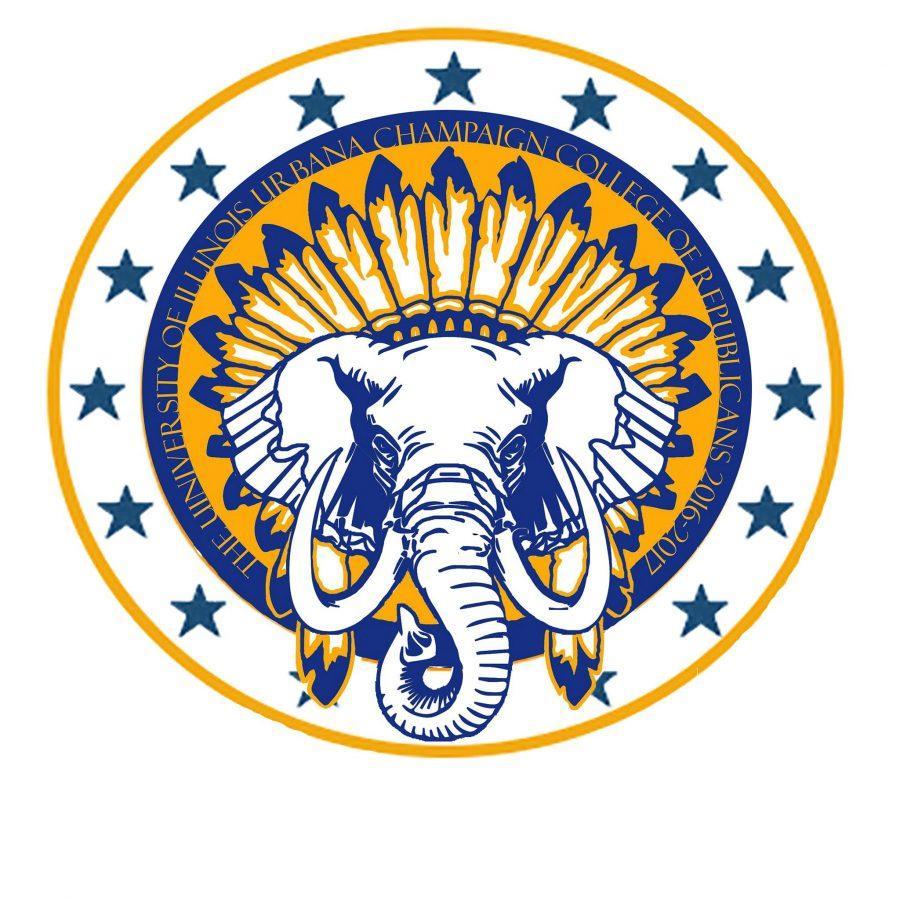Illini Republicans new logo continues debate over the Chief likeness
Photo Courtesy of Illini Republican
Illini Republicans’ new logo features an elephant in front of a depiction of a traditional Native American headdress.
Mar 6, 2017
Illini Republicans are drawing criticism for a change to the organization’s logo, which is part of the continued debate over the use of Chief Illiniwek’s likeness.
The image portrays an elephant combined with features of Chief Illiniwek, the University’s mascot that was retired in 2007 after the National College Athletic Association, NCAA, said that mascots referencing Native Americans were “abusive” toward minorities.
“We wanted to show school pride, show our support for our mascot, our school’s history,” said Timothy Kilcullen, Illini Republicans vice president and senior in LAS.
An overwhelming majority of the organization voted in favor of the new logo, but the Illini Republican member who designed the logo did not want to make her name available to the public, said Kilcullen.
Although the group has not been in conversation with the Native American and Indigenous Student Organization on campus, Kilcullen said he and other Illini Republican members do not see how the image can be interpreted as derogatory toward Native Americans.
Get The Daily Illini in your inbox!
“It’s been a part of our school’s history for a long time. It was not meant in anyway insulting. It was not a race thing,” Kilcullen said. “We don’t see how that’s in any way targeting Indians.”
Thereza Lituma, president of the Native American and Indigenous Student Organization and sophomore in FAS, said she believes students at the University have constant exposure to the Chief’s image and don’t question the ethics behind using the likeness.
“I was upset that, as a group that represents a political party, they decided to take this as an opportunity to take a stance on a different issue that relates to politics,” Lituma said. “To make a statement like that I think they’re really excluding a lot of people from their organization.”
A large reason for the cultural insensitivity is the idea that students want to enjoy the events surrounding the use of the Chief, such as Unofficial St. Patrick’s Day, and do not want to think of the cultural implications, Lituma said.
“Maybe they themselves are normalized, they don’t see anything wrong,” Lituma said. “They just don’t understand certain concepts of Native American culture that make wearing a headdress to be more offensive. To put it on an elephant, an animal, as a symbol they represent, is very insulting to Native Americans all over.”
It is important for a conversation to be started regarding the use of Native American symbols, Lituma said, that way people can start sharing ideas and changes can be made, including a new Illini Republicans logo.
“I think that they should work to have a symbol that represents who they are as an organization,” Lituma added. “Elephants are fine, but I strongly believe that they can associate themselves with this University without associating themselves with the Chief.”
Kilcullen said the group would “probably not” change its logo even if it discusses it with the Native American and Indigenous Student Organization, but it is open to the conversation.
“They’re welcome to share their concerns and we’d love to talk to them about it because we think they’re probably misunderstanding us,” Kilcullen said.
Spencer Haydary, president of Illini Democrats and senior in LAS, said that his organization is disappointed by the Illini Republicans’ new logo.
“The logo was unnecessary,” Haydary said in an email. “We acknowledge that the Chief is problematic and an offensive symbol to many of our students at the University, and we wish that the Illini Republicans would realize that and take that into consideration.”
Haydary said that the group should look for ways to bring about a new University mascot, and show support and solidarity with Native American students.
“The fact that it is continued to be disregarded reveals the biases behind the symbol, and what concerns the Illini Republicans do and do not attend to or care about,” Haydary said.
Illini Republicans are working on reaching out toward minority groups on campus, such as La Casa and Black Students for Revolution, in order to hear their concerns and have discussions regarding the club’s recent accusations of racism, Kilcullen said.
“Our group feels like their history, their values are kind of being, like, squashed on (campus) and they just wanted to show a celebration for what our school is about and what our club is about,” Kilcullen said.






